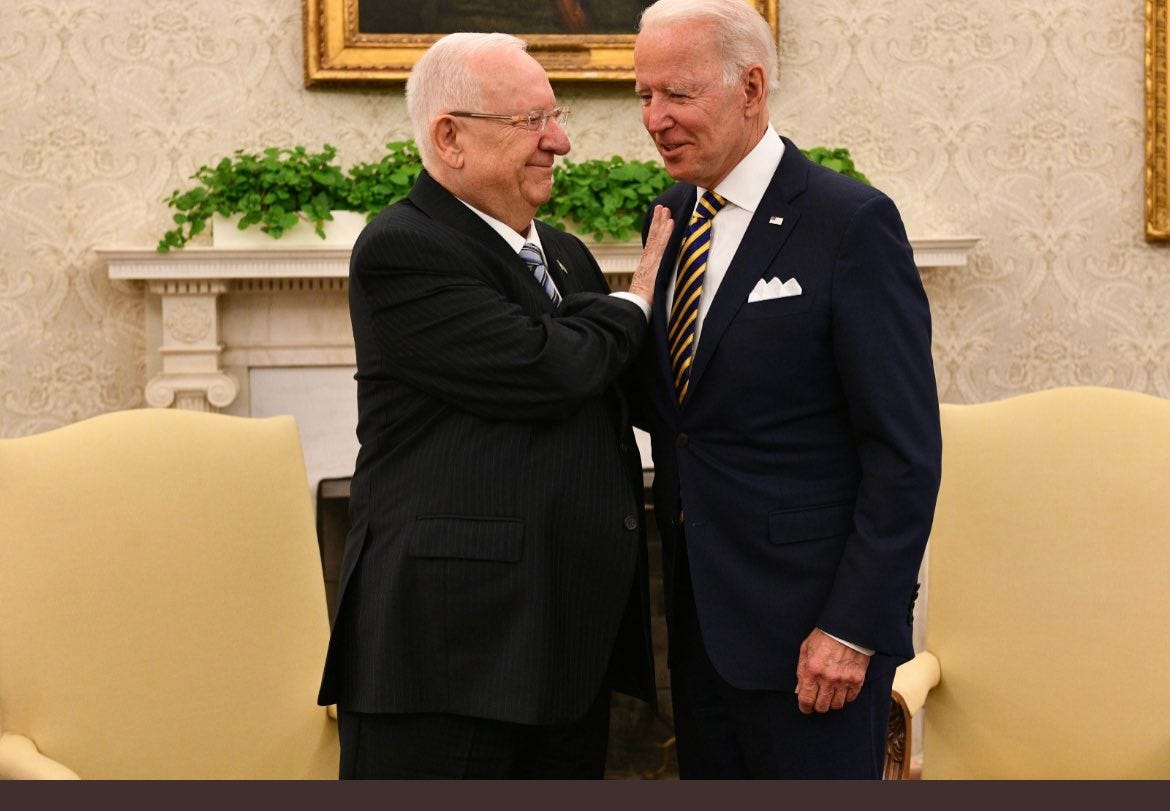Israel Week Ending July 2, 2021
Poland, Rivlin Visits White House, Lapid Visits UAE,Politics, New Weapons, Companies Going Public and more
It has been a hectic week of diplomatic activity for Israel. The first incident began not in Israel, but in Poland, with the Polish Parliament voting to block any attempt made by Jews to recover property lost in Poland. They put a 30-year cap on the number of years during which an individual could request a property be returned. Since more than 30 years passed since the fall of the Communist government, this law effectively eliminates the ability of any Jew or their heirs to stake their claim over their family’s Polish property.
Under former Prime Minister Netanyahu, the Israeli government looked the other way at actions by the Polish government to deny any culpability by the Poles for events that transpired during the Holocaust— instead, hoping Israel could rely on the support of Eastern European countries to block what Netanyahu considered Western European bias against Israel. Foreign Minister Yair Lapid has changed this policy, and publicly condemned the Polish action. Lapid hopes to deepen ties with Western European countries.
Polish Prime Minister Mateusz Morawiecki rebuffed criticism of the new legislation, stating: “I can only say that as long as I am the Prime Minister, Poland will not pay for German crimes—neither zloty, nor euro, nor dollar.”
Of course, the reality is that we are not solely talking about German crimes. Two of my grandfather’s brothers survived the Holocaust and went back to their shtetl (Frystak) after the war to attempt to recover their lumber mill. Tragically, they were killed by Poles, upon their return. Thirty years ago, I visited that lumber mill with my mother. I have no interest in the mill, or in receiving compensation. However, it was not a Nazi who killed my grand uncles, and it was not Nazis who forcibly seized the mill.
1 This is a complicated matter. Israel certainly wants to have good relations with Poland, but, Holocaust revisionism, in absolutely any form, is dangerous.
I had the chance to talk a little about my grand uncles Monday night on-air, during President Rivlin’s visit with President Biden. One of the pleasures I’ve been privileged to enjoy over the past few years is being on live TV during many history-making moments — which over the past few weeks have included: the remarkable vote to confirm our new government, Rivlin’s heartwarming visit to the White House, and Foreign Minister Lapid’s transformational visit to the UAE.
First, about Rivlin's visit … It was clear that genuine warmth exists between the men. While most visits like this are purely ceremonial, Rivlin came with real substance to discuss —specifically, Iran and a potential new agreement. What was said in the closed-door session is unknown, however, both Rivlin and Biden seemed pleased with the meeting. Moreover, Biden publicly invited Prime Minister Bennett to the White House later this month.
Second, Barak Ravid reported that Israel among other things asked the US to go slow on reopening the consulate for Palestinians, so as not to cause the new government any problems as it gets established. I have no doubt the Biden Administration will be amenable. One of Biden’s strong points has always been his ability to put himself in the political shoes of either a friend or adversary, and understand the constraints under which they are working.
Next, Foreign Minister Yair Lapid landed in the UAE to officially open the Israeli Embassy there, and meet with UAE’s Foreign Minister and other government officials. The meetings were warm and friendly, and the Emirates went out of their way to make sure everything was perfect. The two foreign ministers wrote a joint op-ed in the English language local paper touting the growing relationship — stating that it was more than just peace, but rather, a new way of life.
That being said, the most crucial part of Lapid’s visit was the mere fact that it took place. It marks a further step in Israel’s deepening relationship with the Gulf States. Former Prime Minister Netanyahu, (who was instrumental in reaching the Abraham Accords that launched these burgeoning diplomatic relations), wanted very much to visit before the last elections. But that did not occur. In his excellent speech at Embassy opening, Lapid graciously gave Netanyahu the credit he deserves.
Israel’s diplomatic week ended with a visit by President Steinmeier of Germany. While the German presidency is mainly ceremonial, at a time of the rise of the far-right in Germany, it is good to see the symbolic head of State here for a visit.
POLITICS
It was another raucous week in the Knesset, with the opposition doing all it can to gum up the works. No solution has yet been found to passage of the extension of the law that limits Palestinians from the West Bank or Gaza from obtaining Israeli citizenship through marriage. The world will not end if this law is not passed. There will be no sudden wave of terrorism, and the Jewish nature of the State will not be endangered.
It seems the opposition is having a hard time coming to grips with the fact that they are indeed in the opposition. One of the opposition leaders told the head of the arrangements committee, Idit Silman of Yamina, a 40-year-old woman, to “answer like a good a little girl.” Then, an ultra-Orthodox MK called for killing all those who marry a “shiksa” (derogatory Yiddish term for a non-Jew). And the Sephardic Chief Rabbi called the learning of math and science “nonsense”. As a friend wrote me — “I wonder which doctors he sees? … Perhaps, witch doctors?”
Lastly, the government avoided a significant land mine when settlers of the illegal outpost of Evyatar agreed to evacuate today, in return for an amorphous pledge to try to legalize the land and build a Yeshiva there, someday. Defense Minister Gantz was committed to removing the settlement. This face-saving agreement avoids tearing the new coalition apart, and achieves the goal of removing the settlers.
DEFENSE
Yesterday, Hamas sent incendiary balloons towards southern Israel, once again. Last night, Israel responded by bombing Hamas targets in Gaza. Are we headed towards a new round of attacks, or to mutual agreement? It is hard to say. On one hand, the Egyptians have upgraded the level of their mediators, hoping an understanding can be reached before PM Bennett goes to Washington to meet President Biden, and Bennett’s administration can get some of the credit for the deal. On the other hand, the sides remain very far apart, and it's not clear how that gap can be bridged. Israel insists, rightly so, that no agreement can be made to rebuild the damage in Gaza without an arrangement for the return of the bodies of the two fallen Israeli soldiers from the 2014 war and the homecoming of the two hapless Israeli civilians held by Hamas for more than 6 years. Hamas has so far refused any linkage.
All of Israel was shocked yesterday by the tragic death of Colonel Sharon Asman, 42, from a sudden heart attack. Asman had just been appointed to head the Nachal Brigade three days before.
For those worried about Israel’s technology lead being closed by its potential enemies, I say stop worrying. The gap is growing, not closing. Two announcements in the past two weeks underline this fact. The first striking advance was released by Elbit, relating that together with the Ministry of Defense, it had successfully tested an airborne laser system to shoot down missiles, rockets, and mortars. This revolutionary system will cost pennies on the dollars required to operate Iron Dome, and as part of an integrated system, will make Israel’s defensive shield near impossible to penetrate. The second significant technological breakthrough belongs to Rafael, who reported their creation of a major new naval cruise missile; one that is neither GPS-based, nor based on ground electronic systems. This new missile will be near impossible to defeat using traditional electronic, or even kinetic means.
COVID–19
Israel Coronavirus numbers continue to rise — all due to the Delta variant. While some vaccinated individuals have been infected, the vast majority of new infections have occurred amongst the largely unvaccinated youth population. The largest outbreak took place at a Tel Aviv Middle school, where 75 kids were infected their end of year ceremony, held indoors. Why any ceremonies are currently held indoors, in the wake of this new round of infection is an exceptionally good question. Nevertheless, infection numbers currently remain modest, rising to 300 on Wednesday, and a bit below that on Thursday.
Further steps are being taken to control the entry of new virus strains via Ben Gurion Airport, along with returning Israelis. An indoor mask mandate has been reinstated — and at least in Tel Aviv, is primarily being observed. So far, there has been no rise in hospitalizations. The Israeli government is still optimistic that Israel’s exceedingly high vaccination rate (which has been boosted in the past two weeks, as 12-16-year-olds rushed to get shots) will be enough to counter the latest outbreak.
BUSINESS
June was an unbelievable month for Israeli firms raising funds through public offerings:
June 10 … monday.com raised $573 million, on a valuation of $6.8 billion.
June 16 … Walkme raised $287 million, at a valuation of $2.5 billion.
June 28 … Payoneer Global raised $750 million, at a valuation of $3.3 billion.
June 30 … Taboola raised 260 million, at a valuation of $2.6 billion.
June 30 … Iron Source raised $850 million, at a valuation of $11.1 billion.
With so much money available in SPAC (special purpose acquisition companies), we can expect more Israeli firms to take advantage of the opportunity to go public in the coming months.
ECONOMY
Finance Minister Avigdor Lieberman has begun to lay out some of his economic plans. His first action was to stop the special unemployment insurance for those affected by Corona. The rationale behind the policy shift is that many companies are having a hard time finding workers. The assumption being, if you end the unemployment insurance for all those under 45, you can save money and provide the market with workers. If the new wave of Coronavirus does not spread, this new policy might work (assuming you are not a guide for foreign tourists). We will see over the next few weeks.
Another decision made by Lieberman is downright stupid. He wants to eliminate the $75 exemption of V.A.T. on goods purchased abroad. Israeli retailers and importers have been complaining about the competition, and some in the Treasury complain about lost revenue. However, there are two things Lieberman and the minions in the Treasury do not understand. First, the biggest problem with importing items is not the V.A.T., but the huge fees the shipping companies charge for clearance. If it's not a very large shipment, the clearance fee tends to be much higher than the actual VAT. For instance, if you buy a $25 replacement charger for your computer, you will pay more to the shipping company for clearance. This new decision will make the purchase of items abroad too expensive to compete with the local importers, who, for generations, have become rich at the expense of average Israelis.







